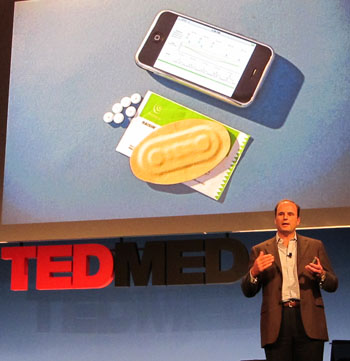
The global market for telecommunications is about $4 trillion to $4.5 trillion, Proteus Biomedical CEO Andrew Thompson noted during his presentation at TEDMED this week in San Diego. While there is this ongoing debate about healthcare reform, I noticed that there isn't a reform discussion taking place about technology markets, Thompson said. That's interesting, but it's important to know the reasons why: It starts with the definition of "innovation" in the technology sector vs. the definition of "innovation" in healthcare. For the tech industry innovation means better and more affordable, while in healthcare innovation means better and more expensive. That means every year you get less for your money in healthcare, which is the exact opposite for the tech market, Thompson said.
What's more the products people sell in healthcare generally don't work or work well, Thompson said, and then assured the audience he wasn't making a "cheap jibe."
"It's a very, very expensive jibe," he deadpanned.
Thompson said that Lipitor, a very popular medication for high cholesterol, results in a therapeutic benefit for less than 10 percent of those who take it.
The "MEDs" should follow the "TEDs," Thomspon said, and define innovations as those offerings that are better, more available, and more affordable. That means consumerizing the product, Thompson said -- the dominant computing platform on the planet is the cell phone. The MEDs also need to "globalize" and use the large number of these devices to drive down costs, while reaching a very large population: 4 billion cell phones are in use on the planet. Thompson said that probably hundreds of millions of those devices are owned by people who make less than $10 dollars a day. Many of those will never see a doctor, Thompson said. Ever.
Thompson said that Proteus Biomedical is currently testing its intelligent medicine system with hypertension patients, heart failure patients and tuberculosis patients. Proteus’ Raisin technology runs on an electric charge generated by the patient’s stomach acid. The charge is detected through the patient’s body by a sensing patch on the patient’s skin. The patch records the time and date that the pill is digested and also measures certain vitals, which the company calls the Sentinels of Wellness, including heart rate, activity and respiratory patterns. The information is then sent to the patient’s mobile phone and then onto the internet for caregivers to review and analyze.
Families care for patients, Thompson said. These caregivers are the largest group of healthcare workers in the world today, because they do most of the work by caring for people in their family who are sick.
"iTunes is big," Thomspon said. "iMeds is much, much bigger."














